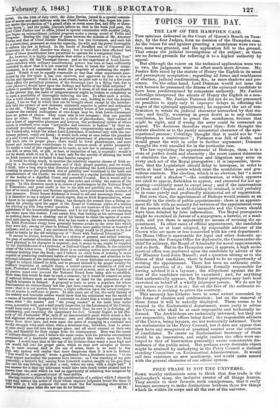TOPICS OF THE DAY.
THE LAW OF THE HAMPDEN CASE.
Tan opinions delivered in the Court of Queen's Bench on Tues- day, by the four Judges, form no decision of the Hampden case. As the voices for and against granting a mandamus were two to two, none was granted, and the application fell to the ground. That estops the judicial investigation of the subject ; as there are no formal grounds for referring it to a higher authority by appeal.
But although the voices on the technical application were two to two, the judgments were in effect much more diverse. Mr. Justice Erie stood by the statute of Henry the Eighth in its usual and peremptory acceptation ; regarding all forms and semblances of election, judicial confirmation, &c., as mere shadows and pre- tences. On the other hand, Lord Denman would not issue the writ because he presumed the fitness of the episcopal candidate to have .been predetermined by competent authority. Mr. Justice Coleridge interpreted the statute of Henry. the Eighth in a non- natural sense. Mr. Justice Patteson did not do so, but presumed its penalties to apply only to improper delays in effecting the stages of the episcopal appointment; he supposed the act of con- firmation to retain its judicial character untouched by that sta- tute; and finally, wavering in great doubt as to any ultimate conclusion, he inclined to grant the mandamus, because that might be right, and if wrong the error could be corrected on appeal. The decisions therefore stand thus: Erle thought the statute absolute as to the purely ministerial character of the epis- copational process ; Coleridge thought that it could not be "so blasphemous a contrivance " ; Patteson was full of doubt, and would grant the writ in order to further argument; Denman thought the writ uncalled for in the particular case.
The law regulating the appointment of Bishops, then, is in a state of perfect doubt and obscurity ; the court cannot determine or elucidate the law; obstruction and litigation may arise on every such act of the Royal prerogative : it is impossible, there- fore, that the Legislature should delay to interpose, in order to settle at least those points which raise the scandalous and gra- tuitous contests. The election, which is no election, but "a mere mockery and a shadow "—the confirmation, at which opposers are cited to appear, forbidden to appear, and censured for not ap- pearing—evidently must be swept away ; and if the intervention of Dean and Chapter and Archbishop be retained, it will probably be in some purely and professedly ministerial act of registration. But even then, the appointment of Bishops would remain as an anomaly in the circle of public appointments: there is an appoint- ment for life with no security for revision of the appointment even if the person should be unfit or incapable and the Crown should have been deluded by false information. The Royal prerogative might be exercised in favour of a scapegrace, a heretic, or a mad- man, and yet there is apparently no means of revising the ap- pointment. In other cases of official appointment, the candidate is selected, or at least adopted, by responsible advisers of the Crown who are more or less connected with his own department : the Home Office is answerable for legal and other domestic ap- pointments, the Foreign Office for diplomatic, the Commander-in- chief for military, the Board of Admiralty for naval appointments, and so forth. But in the Hampden case, it appears, a high eccle- siastical office was conferred upon the candidate by advice of the lay Minister Lord John Russell; and a question arising as to the fitness of that candidate, there is found to be no opportunity of revising the appointment. There has been no authentic eccle- siastical sanction of it; the Minister formally responsible for having advised it is a layman ; the allegations against the fit- ness of the candidate cannot be examined ; and, for anything that authentically appears, the Royal prerogative may have been exercised on behalf of a wholly improper person. We do not by any means say that it is so ; but on the face of the authentic re- cords there is nothing to prove the contrary. This anomaly has hitherto been to some extent concealed by the forms of election and confirmation ; but on the removal of those forms it will be nakedly displayed. There seems to be wanted in the Ecclesiastical department, some party to advise the Crown who shall be at once responsible and technically in- formed. The Archbishops are technically informed, but they are not responsible, their offices being fixed ; the responsible advisers of the Crown, being laymen, are not technically informed. There are ecclesiastics in the Privy Council, but it does not appear that they have any recognized or practical control over the selection of candidates. To create an Ecclesiastical Secretary of State would be an innovation, and might (unless the office were en- larged to that of Instruction generally) excite considerable dis- turbance of the public mind. But perhaps every desirable object might be attained by embodying in the Privy Council a distinct standing Committee on Ecclesiastical Administration. It would call into existence no new machinery, and would quite accord with the general character of our official system.


























 Previous page
Previous page